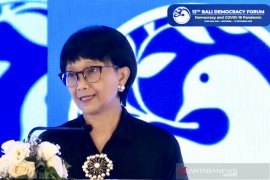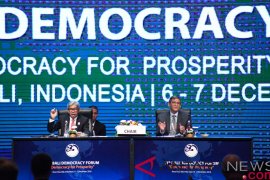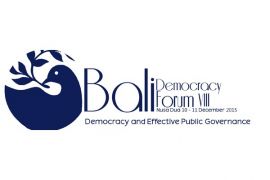Aristotle contrasted rule by the many (democracy/polity) with rule by the few (oligarchy/aristocracy) and with rule by a single person (tyranny or today autocracy/monarchy).
He also thought that there was a good and a bad variant of each system where he considered democracy to be the degenerate side of polity.
For Aristotle the underlying principle of democracy was freedom, since only in a democracy can citizens have a share in freedom. In essence, he argued this was what every democracy should aim for.
There are two main aspects of freedom: being ruled and ruling in turn, since everyone is equal according to number, not merit, and to be able to live as one pleases.
Well, according to some theories democracy is a means for the people to choose their leaders and to hold their leaders accountable for their policies and their conduct in office.
In the long run, Indonesia which is now known as the third largest democracy in the world, and one of the most influential countries in the Asian region took the initiative to host a forum dedicated exclusively to discussions about democracy.
The forum known as the Bali Democracy Forum was established in 2008 and is being held annually to promote democracy worldwide.
Indonesia and Democracy
Indonesian President Susilo Bambang Yuhoyono in his speech at the opening of the fourth Bali Democracy Forum in Nusa Dua, Bali December 8, 2011 said that democracy must bring greater freedom.
"It should provide ample space for citizens to live his or her life in freedom - freedom of religion, of association, of expression," the president said.
More than just bringing freedom, democracy should also bring about peace, president Yudhoyono said.
"We experienced it in Indonesia in the early years of democratic transition, where we witnessed the proliferation of communal conflicts in certain areas during certain times, today, peace and stability reigns throughout Indonesia," said Yudhoyono.
Even so, Indonesia remains vigilant as Indonesia is not totally free from the prospect of new communal conflicts flaring up and this is a problem that is also faced by other nations that are undergoing democratic transition.
Apart from bringing freedom and peace, democracy must bring about moderation which is important because often democracy can give rise to extremism and radicalism of all sorts.
Extremists are usually tempted to misuse the democratic openings for their own gains, without actually ever believing in the merit of democracy.
"This is something that can happen in western democracies as well as Asian, African or Latin democracies," Yudhoyono said.
Besides freedom, peace and moderation, democracy must also bring progress which is considered as a challenge for many democracies.
"In a perfect world, democracy brings all these things together. But we do not live in a perfect world. We live in an imperfect world where things do go wrong, where the good is often trampled and hope is often wasted," the president said.
On the same occasion, President of the democratic Socialist Republic of Srilanka Mahinda Rajapaksa said that democracy is not only a system but also a strong commitment to a way of life.
"It is however a constant challenge to ensure that our practice of democracy remains at all times responsive to the priorities and aspirations of our people, so that their confidence in the system is continually strengthened," Rajapaksa said.
Rajapaksa also emphasized that democracy must have a direct impact on everyday life, the mechanism of government must have effective applications at the grassroots level, in order to address issues and to provide relief.
The Bali Democracy Forum
Indonesia launched the first Bali Democracy Forum in December 2008 in Bali with Australia as the Co-Chair. The theme of the 2008 BDF was "Building and Consolidating Democracy: A Strategic Agenda for Asia".
The second Bali Democracy Forum was held in December 2009 in Nusa Dua, Bali with Japan as Co-Chair with the theme "Promoting Synergy between Democracy and Development in Asia: Prospects for Regional Cooperation".
Again in 2010 the third forum was held with the main theme "Democracy and the Promotion of Peace and Stability".
The theme of this year`s Bali Forum was "Enhancing Democratic Participation in a Changing World: Responding to Democratic Voices".
This year`s forum focused on efforts towards enhanced people`s participation by way of responding to democratic voices and relevant issues involved in the process.
"Through its work, the Bali Democracy Forum has laid a solid foundation for the promotion of democracy by ensuring that deliberations are built upon the themes and discussions in the previous sessions," said Indonesian Foreign Affairs Minister Marty Natalegawa on the same occasion.
As highlighted in the third Bali Democracy Forum, all states are encouraged to ensure the attainment of democratic dividends through the creation of peace, stability and equitable prosperity.
"During this time, of rapid and dynamic changes, the virtue of democracy is once again being tested, States are expected to be more responsive to the changing needs and concern of their people," Marty said. (*)
Reporter: By: Ageng Wibowo
Editor: Kunto Wibisono
Copyright © ANTARA 2011










